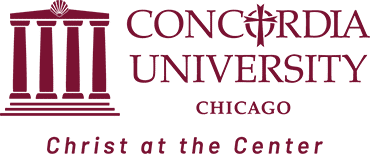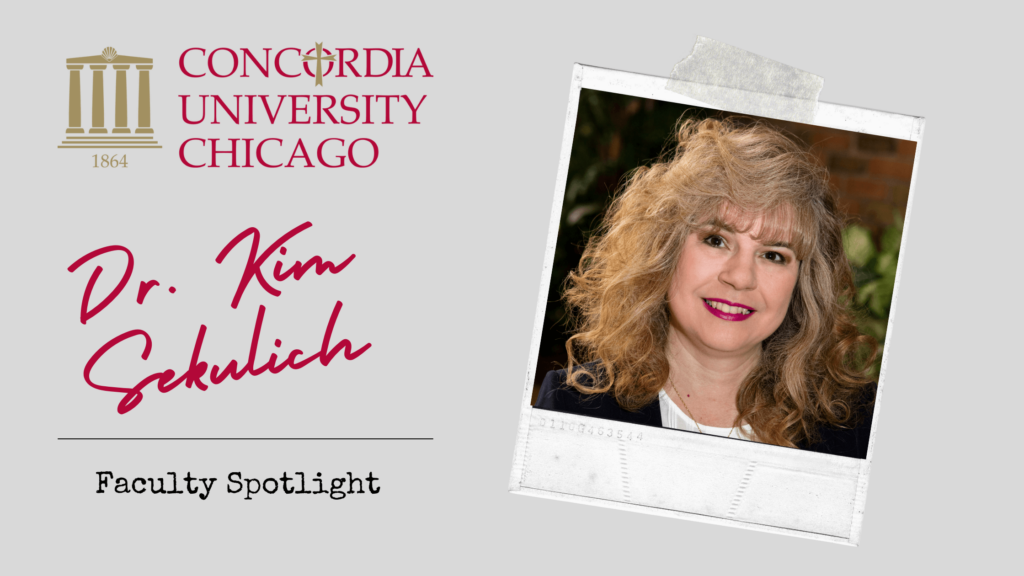What programs do you teach at Concordia University Chicago? What drew you to this field of study? What keeps you excited about it?
It is my pleasure to serve as Associate Professor of Educational Leadership at Concordia University Chicago – it is a calling and a commitment. Educational leadership is my passion. I am excited to prepare graduate students to be leaders who will have the knowledge and skills to address challenges they may face in the future.
Through my role as Program Leader in the Division of Leadership, I continually update courses to maintain current and relevant curriculum aligned with professional standards. The Division of Leadership excels at offering many leadership programs including Chief School Business Official, Educational Administration, Illinois Principal Preparation, Teacher Leadership, Educational Leadership, Educational Leadership with Illinois Superintendent Endorsement, and Educational Leadership with Ohio Superintendent Licensure.
I teach master’s and doctoral-level leadership courses. Before a course even begins, I reach out to my students to welcome them, share important course information, and encourage them to reach out to me throughout the term for assistance. I am committed to making each course a rewarding and successful experience and enhancing graduate students’ growth as leaders. My goal is to expand students’ leadership preparation knowledge and experience and inspire them to put the strategies I model into practice within their own schools, districts, or organizations.
How will your program better prepare/equip educators for the current climate were in (specifically moving into post-COVID teaching)?
Division of Leadership courses provide excellent opportunities for graduate students to gain experience with making well-informed leadership decisions. I wrote a professional journal article entitled, Leadership for Collaborative Decision-making that was published in The Delta Kappa Gamma Bulletin: International Journal for Professional Educators. I mention my article’s title because developing collaborative decision-making skills is one way to prepare for the post-COVID educational climate.
Also integrated within graduate student experiences are empathy, communication, critical thinking, problem-solving, organization, and flexibility. Course objectives and content are of the highest quality and address additional key leadership competencies such as analyzing data, utilizing effective strategies to close achievement gaps, and leading system improvement. Having a strong skill set in all of these areas is essential when serving in a leadership role and working collaboratively to create excellent programs to address students’ diverse needs.
What attracted you to Concordia University Chicago to teach at? What sets them apart?
Student learning is the highest priority at Concordia University Chicago. Student learning is my top priority as well. I value student learning and success, and each student. Concordia University Chicago is to be commended for putting into practice the core values of Christian faith, the individual, excellence, integrity, and service. These core values are lived each day. My own values are very much aligned with Concordia’s values, and I felt drawn to Concordia University Chicago.
What is your professional background as an educator?
I have an Ed.D. in Educational Leadership from National-Louis University and an M.Ed. in Administration/Supervision from National-Louis University. I graduate Summa Cum Laude from Barat College with a B.A. in Psychology/Education.
Before coming to Concordia University Chicago, I was an administrator in public and private schools. I have a wide range of experience with analyzing data, implementing change processes, and continually improving curriculum, instruction, and assessment systems.
Tell us a little about yourself. Why did you become interested in education?
From a very young age, I always knew I wanted to be a teacher and even set up a pretend classroom in my home to role-play being a teacher! Throughout my education, I remained focused on my studies and was also eager to take on student leadership roles. For example, in high school I was the vice president of National Honor Society. In college, I received the Barat Cup for Academic Excellence which was awarded to the senior who had the highest cumulative grade point average.
After graduating with a bachelor’s degree in psychology/education, I served successfully as an elementary school teacher. I was then encouraged by school district leaders to pursue a master’s degree in administration/supervision, and a career in educational leadership to make an even greater impact on student learning. I love bringing about the joy for learning that takes place when students experience success! As a life-long learner, I completed my doctoral degree in educational leadership while continuing to serve as a school administrator.
What would you tell prospective students considering your program about yourself? What’s something that students and colleagues should know about you?
Some words that describe me are ethical, trustworthy, student-centered, caring, dedicated, and knowledgeable. While teaching courses, I work diligently to provide support and detailed feedback to graduate students on their coursework. Students frequently comment on how they appreciate my feedback and how much it helps them grow as leaders and develop their writing skills. In addition, I mentor students in the dissertation process, write articles for publication, present at conferences, and lead committees within the College of Education.
What advice do you have for students interested in pursuing their Educational Leadership degree? How can people stand out in this field?
To be outstanding leaders in the field of education . . .
- Remain focused on the school/district or organization’s mission and vision and the priority of student learning
- Communicate, collaborate, and work to build community
- Continue to expand your knowledge base and share your expertise with colleagues


